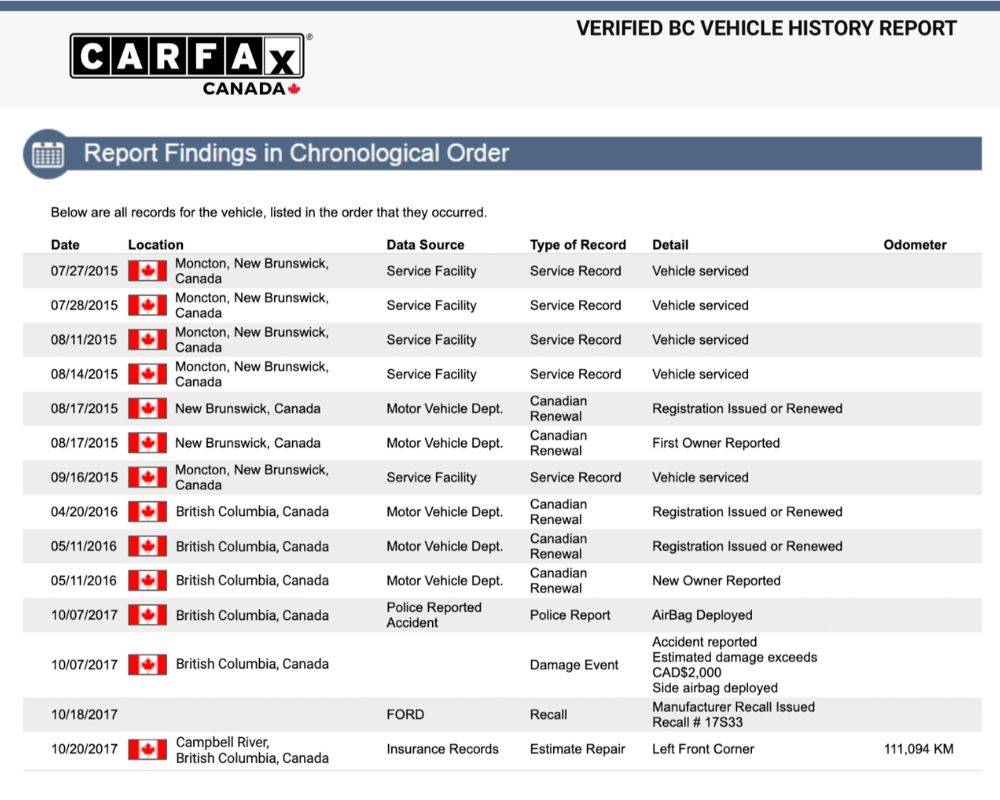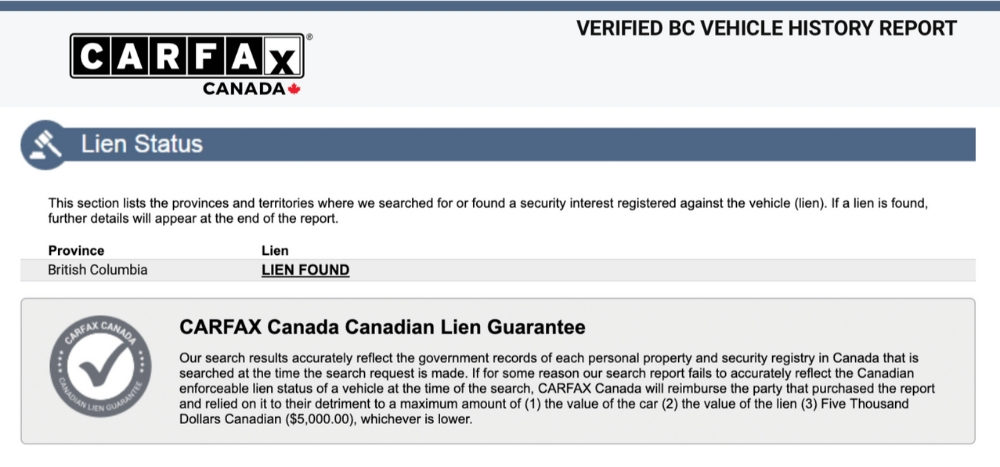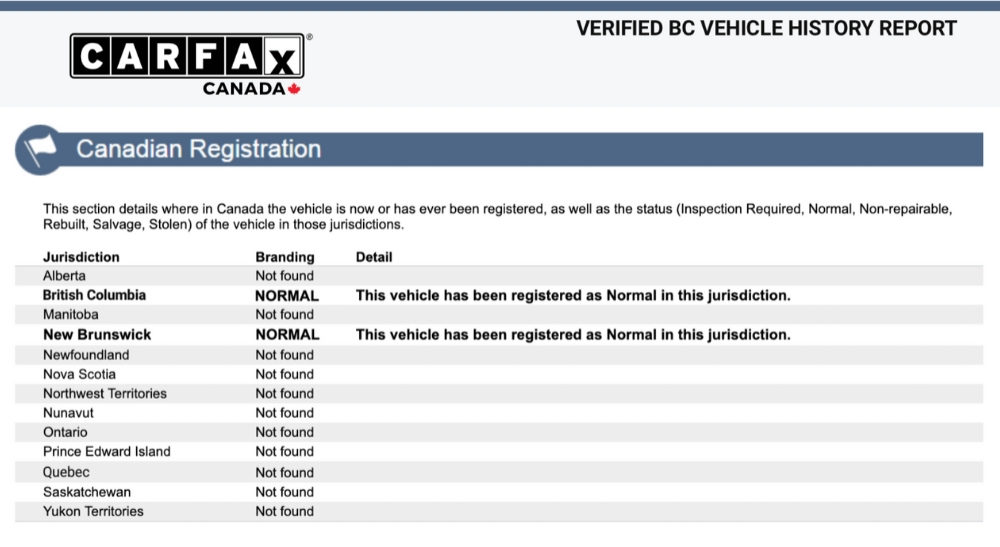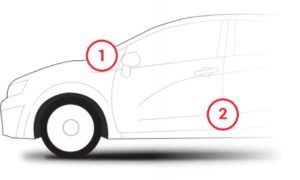You’re cruising the used car lot at the dealership around the corner and you spot it—the perfect car. Not too much mileage, cheap to insure, and the price tag is just right.
Thoughts of driving off into the sunset together happen immediately.
Although it may look like a great deal, don’t overlook one critical step in your buying process: getting a vehicle history report.
According to Canadian Motor Vehicle Traffic Collision Statistics, there were over 150,000 reported vehicle accidents in Canada in 2018. That’s why vehicle history reports in Canada are so important. You want to make sure that your new car hasn’t sustained serious damage in a past accident.
How do you get your hands on one of these reports? There are paid and free options that provide varying degrees of details. You can choose which one of these five options works best for your situation.
How to get free vehicle history reports
1. Ask the seller to provide a vehicle history report
If it’s a personal sale, you can ask the seller to provide the vehicle history report for you—private owner or dealership alike. In fact, dealerships will be in a better position to provide one. They probably wouldn’t have bought it themselves if they didn’t read the vehicle history report first.
Just shoot them an email asking for it.
If they say no, then that’s a red flag. If it still seems worth exploring anyway, you can always ask them for the VIN (Vehicle Identification Number) and pay for a CARFAX report yourself.
2. Get a free (but limited) vehicle history report from VINCheck
VINCheck is the new kid on the block. While not as detailed as CARFAX reports, it’s hard to argue with a free vehicle history report when you’re just doing some basic research on your next car.
Specifically, it can tell you if the car sustained any damage. Finer details like ownership history or service history might not be available, but you’ll be able to spot important red flags by looking for big repair bills. The vehicle’s car accident report shouldn’t affect your own car insurance rates, but sometimes the related damage can weaken the car’s frame. Just something to be aware of!
3. Get a CARFAX Canada free vehicle history check
Don’t want to spend any cash on the vehicle history report? You can get a free abbreviated version from CARFAX using its VIN Decoder tool. Pretty handy, right?
It’s basically a summary of the paid detailed report, which is handy for giving you highlights on:
- Recall notices
- Accidents
- Other types of damage
It’s a good place to start looking into a car before you buy it. If the vehicle history report has some suspicious items that warrant a closer look, then you can get a paid CARFAX report through the dealership, the owner, or you can buy one directly.
4. Free motor vehicle safety recall tool
If you really can’t afford the detailed report, the government provides a recall database where you can enter any make, model, and year and they will tell if you there have been any recalls on that vehicle (you could combine this with the free CARFAX check.)
Remember that if you can’t get the vehicle history report, you should still get a professional inspection. They might be able to spot poor repairs or past damage from previous accidents. If accidents were never reported, then they wouldn’t show up on the vehicle history report.
Optional: Get a CARFAX paid vehicle history report
Sometimes there might not be any other option to see a vehicle’s history. You might just have to buy a report directly, and CARFAX wears the crown.
Here’s what to expect:
- You’ll need the 17-digit vehicle identification number (aka the VIN).
- The report shows previous ownership, accident history, and safety recalls.
- You’ll find a lien search on the vehicle as well.
- A verified report costs $54.95 CAD.
No one wants to spend money on a car they don’t even own, but having the information can save you a lot more money down the road. Better to spend that $55 on a report, spot a red flag, and avoid paying an extra $2,000 in repairs after buying a damaged vehicle.
Which details are included in the CARFAX vehicle history report?
Getting a verified vehicle history report shows you all kinds of details that you’d never know about just by browsing dealership websites. They include:
- Major accidents
- Total loss
- Salvage
- Rebuilt
- Frame and structural damage
- Hail damage
- Flood damage
- Vehicle theft
- Service and inspection records
- Repair estimates and costs
- Open recalls
- Airbag deployment
- Odometer readings
- Odometer rollback
- Registration
- Lemons/CAMVAP
- U.S./Canada import records
- Detailed U.S. history
- One-owner vehicles
- Accident-free vehicles
Check out this sample vehicle history report to get a sense of what you get when you buy one.
How to Read a CARFAX Vehicle History Report
There are eight important sections to pay attention to when you’re reading your vehicle history report. Pay attention to all of them, since any one of those eight sections could contain red flags.
- Report Findings in Chronological Order
- Accidents & Damage
- Lien Records
- Canadian Registration
- Stolen Status
- U.S. History
- Recalls
- Service History
Report Findings in Chronological Order
This is the chronological history of your vehicle reports so you can see things like how often the vehicle was serviced and if there were any police reported accidents.
There are separate sections for accidents and service history, but seeing it all together can help you spot patterns. For example, you might see a repair bill attached to it even if there was no reported accident preceding it.
Accidents & Damage
A very important section for obvious reasons, this is where you will find a list of all accidents reported to the police, including:
- when they happened
- what happened (i.e. airbag deployed)
- Repairs
- estimated costs of repairs
- insurance claims
- odometer reading a the time of the accident
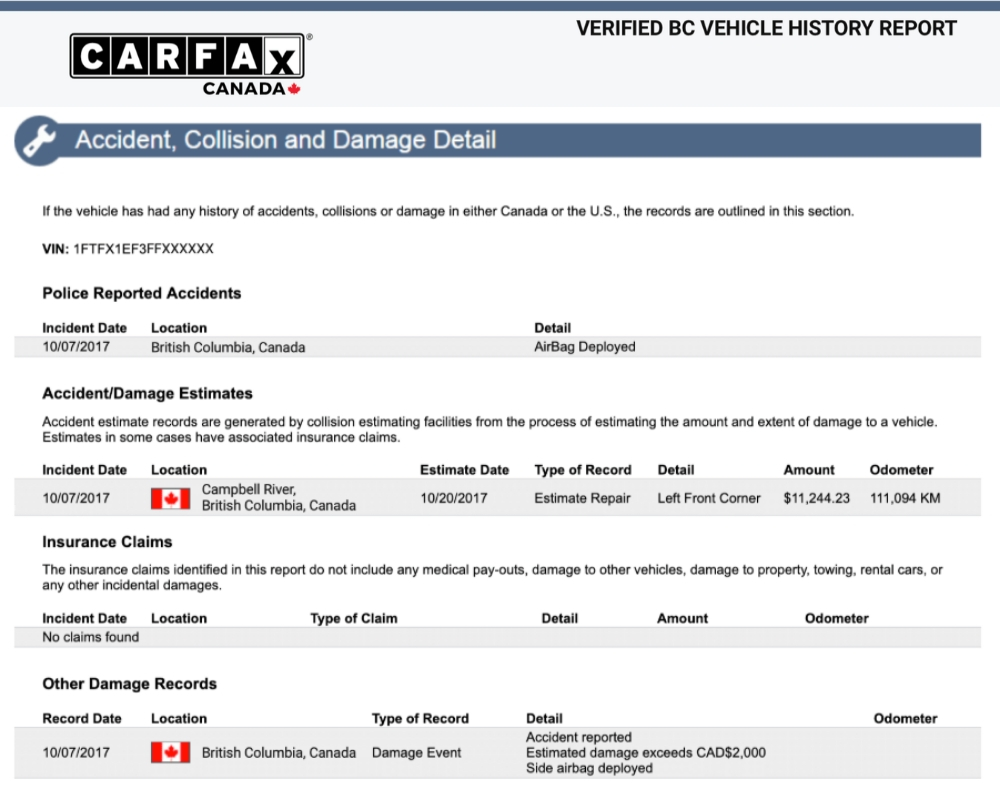
Lien Records
A “lien” is a security interest registered against a vehicle. If the report finds one, it will provide details like the province, time of registry, and what was registered.
Canadian Registration
This report tells you where the vehicle is registered in Canada.
Stolen Status
If the vehicle has been reported stolen, you’ll know about it here (talk about a red flag!).
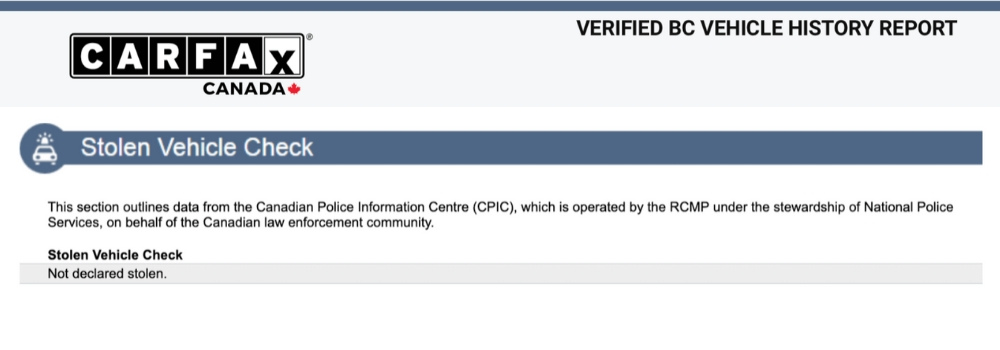
Import Records
Generally you won’t need to worry about this report, as it only applies to vehicles imported from another country. It’s not used very often.
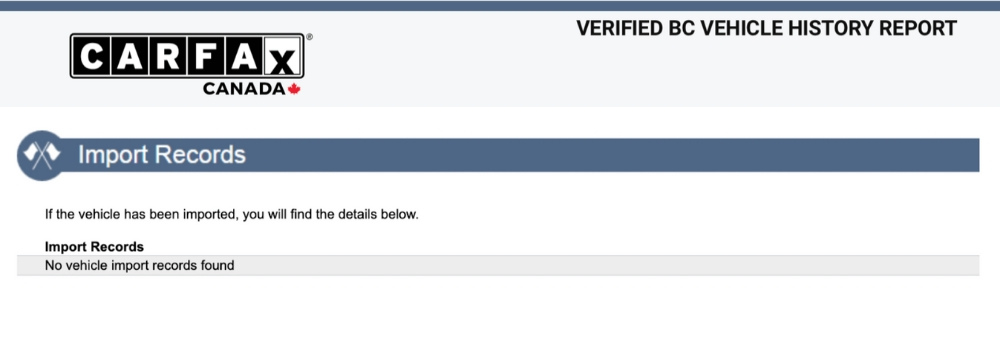
U.S. History
If your vehicle has any history in the United States, like accidents, damage, or import records, it will appear here.
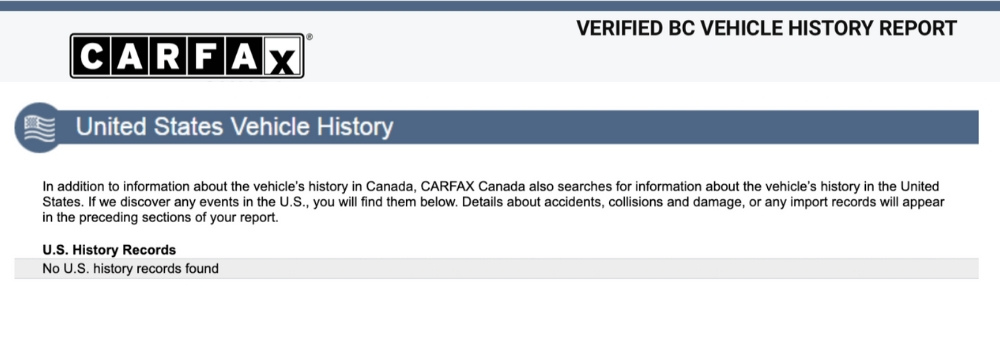
Recalls
Any past recalls that apply to the vehicle will be listed here. If you do find a recall notice on the vehicle, then it’s worth asking the owner if it was serviced. Use the “Report Findings in Chronological Order” section or the “Service History” section to verify any repairs or maintenance related to the recall.
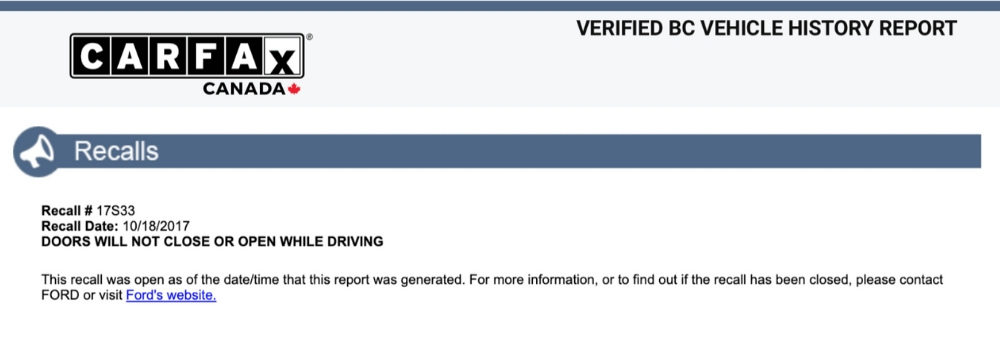
Service History
This section is very helpful because you can see how often the car has been serviced, what was done, and if any additional repairs were needed. For example, you could see if the brakes were replaced, or if there has been trouble with the transmission.
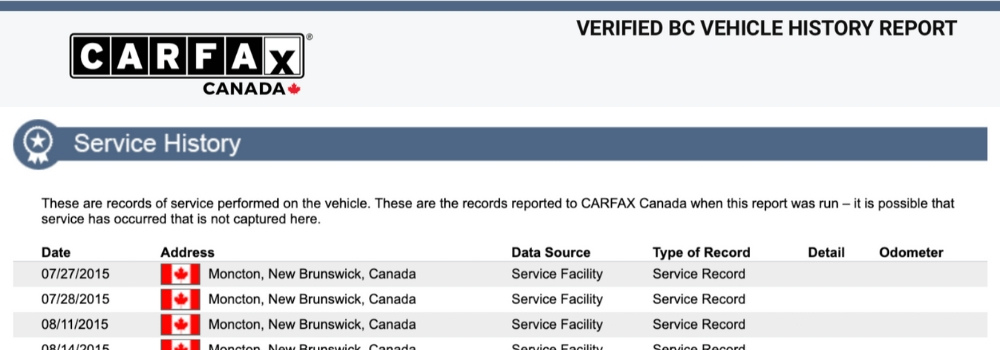
Frequently asked questions about vehicle history reports
Is it safe to buy a car that’s been in an accident?
Any vehicle that has had major bodywork done will be MUCH cheaper because of it. However, if the accident caused serious damage to the car structure, then there could be some hidden issues with the car itself—a weaker frame, permanent alignment issues, or transmission issues could result from substantial damage.
If the owner can produce credible repair records from the accident and they are minor, it is probably worth the discount.
Should I get an inspection before buying?
If you can afford it, yes. Poor repairs or improper parts can be spotted with a professional eye and save you a lot of money down the road. You are investing thousands of dollars in this purchase, after all. Don’t skimp on a $55 report if it helps you avoid thousands in repairs down the road.
Can I request a vehicle history report from the seller?
Yes, you can ask a personal seller to provide you with the vehicles report (and you should). If they’re hesitant, that’s a bit of a red flag and a good way of filtering potential lemons out of your search. If they are being honest about the accident history, why not share the report? If they do not want to produce it, you can always get a quick overview of the car’s history for free with its VIN.
Where can I find the VIN on my car?
Most vehicles have their Vehicle Identification Number on the front windshield and on the driver side door:
What does a “clean title” mean?
When people say the car has a “clean title,” what they mean is it doesn’t have a history of insurance claims. It DOES NOT mean that it has never been in an accident or that it’s not a lemon. Remember that crucial difference when you’re buying your car!
That’s a wrap on Canadian vehicle history reports. Check back here whenever you’re in the market for a new car to spot the red flags.
Happy hunting!


